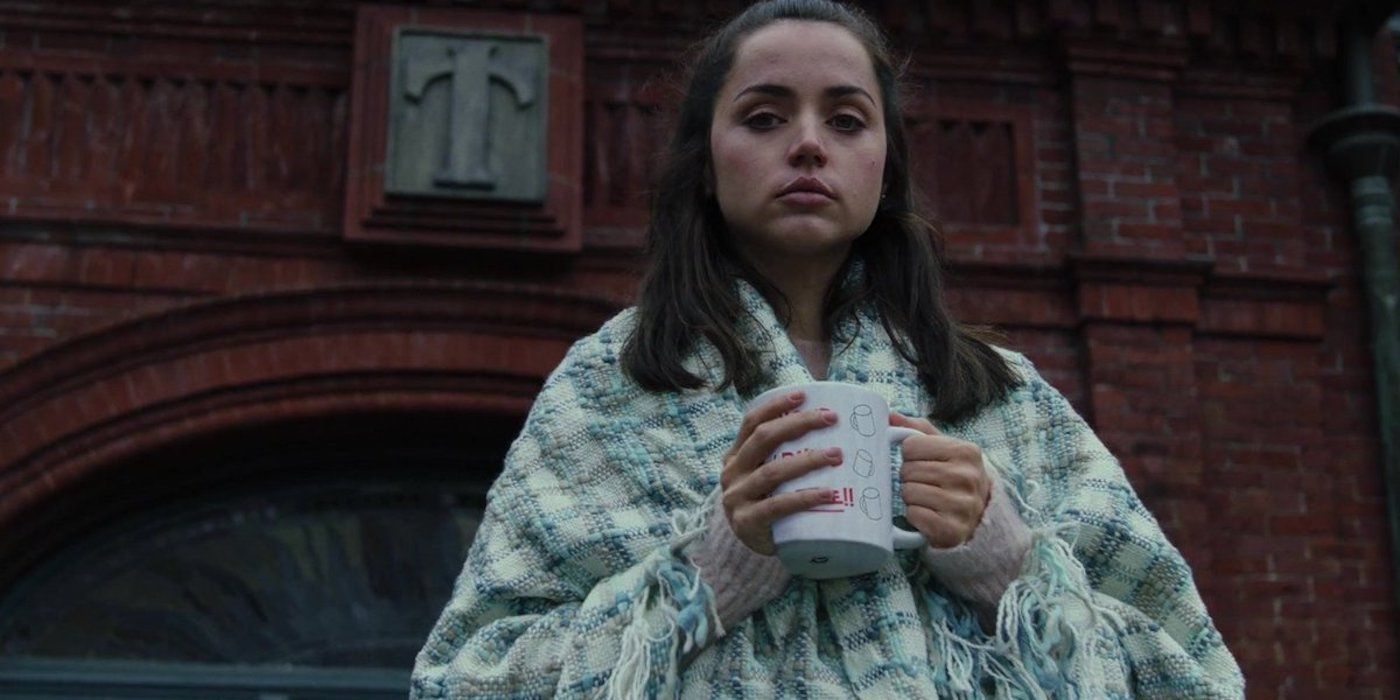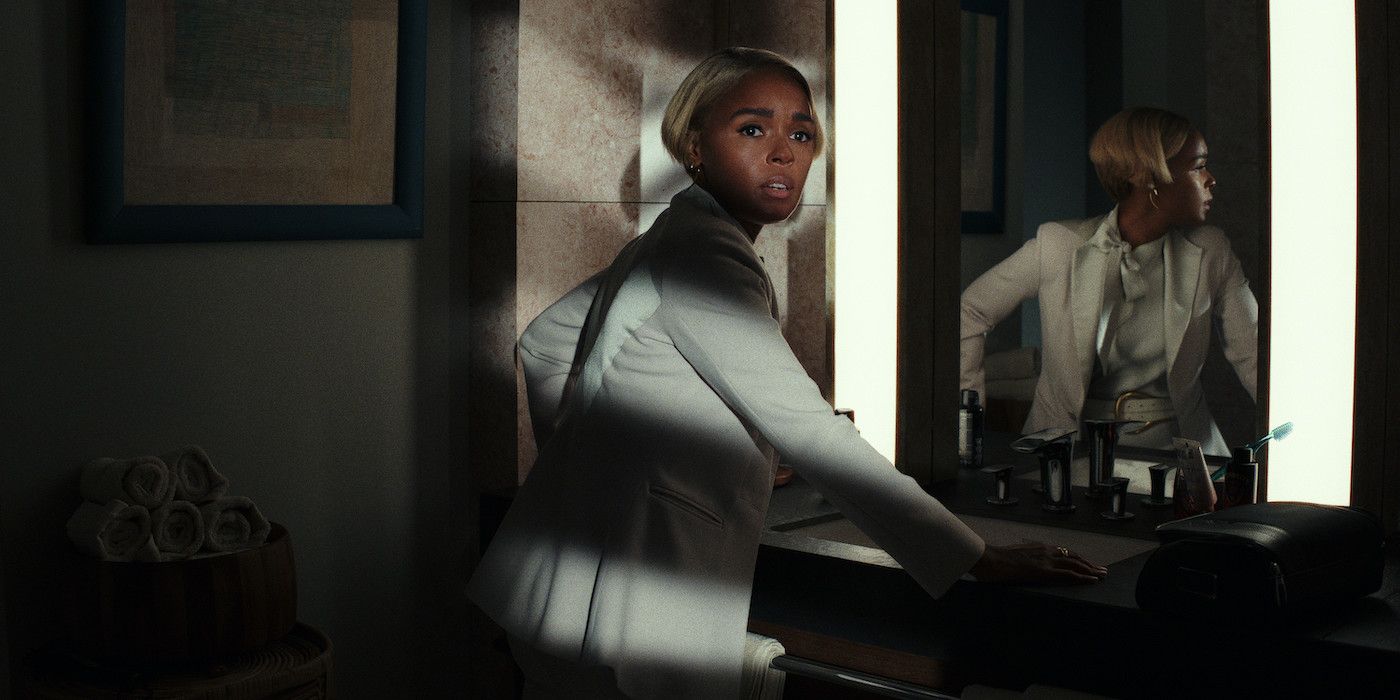Rian Johnson's Knives Out and its new sequel, Glass Onion, have both breathed new life into the mystery genre. The films manage to capture the feel of a classic Agatha Christie detective story while maintaining their own modern flair. Our detective Benoit Blanc (Daniel Craig) and his eccentric yet empathetic approach to mystery-solving play a big part in this. He’s brilliant, yes, but he also gets invested in his cases on a more personal level which in turn helps us to empathize with him and the case at large. But Blanc is only part of the equation, it’s the characters that become his partners-in-crime-solving that are the true magic in these films. Blanc is our detective, but he’s not our main character. At least not in the sense that he provides resolution, he simply illuminates it.
Blanc is largely static. It's his job to come into the story fully formed, so we can see how he affects the other players. The true transformation we latch onto is that of his partners in each film. Marta Cabrera (Ana de Armas) in Knives Out and Helen Brand (Janelle Monáe) in Glass Onion are not only essential to unraveling the mystery of each film but serve as the vessel through which the film’s central themes are carried out. Their journeys and their hearts are the reason we as an audience feel like so much is at stake in these stories. In both Knives Out and Glass Onion, Blanc’s partners are the driving force in the story and the element that makes us care.
'Knives Out's Marta Is Our Point-of-View Character
Marta is a good person and a good nurse. This is an essential truth of her character. It’s what puts her in the unique position of being the only person who can really shed light on the truth of Harlan’s (Christopher Plummer) death in the first film. She’s Harlan’s caretaker and his only real friend, the only person who seems to care for him without expecting anything in return. Marta’s selflessness is both a boon and a curse, she’s kind, but she’s also too trusting. It’s why Ransom (Chris Evans), Meg (Katherine Langford), and the family at large are able to manipulate her so easily because she was told she was “like family” to them and believed they meant it. She’s our point-of-view character for most of the film, and so we sympathize with her even while we believe, like she did, that she was responsible for Harlan’s death. Everyone else in the film seems largely unwilling or unable to change. Ransom pretends he found clarity and has moved past his greed, but it’s only a facade. Marta is remarkable not just because of her unique affinity for truth-telling but because she is so incredibly earnest. She wants to clear her name but as soon as a life is on the line, she throws in the towel and fesses up. She’s not the kind of person who would willingly hurt others for her own gain and that is what truly separates her from the Thrombey family.
Marta Refuses to Play the Thrombeys' Game
The family used Marta’s position as a caregiver, an employee, an immigrant, and a child of an illegal immigrant as a way to manipulate her. They switch between insulting and othering her to calling her “one of the family” on a whim based on what they need from her at any given time. But her relationship with Blanc is also a fascinating point. Their interactions are filled with anxiety on Marta’s part as she is fully convinced of her guilt even after Blanc has discovered the truth. Even as she (unsuccessfully) tries to obscure the investigation, she spends an equal amount of time actually helping. Her innate goodness is what allows her to eventually find the toxicology report that proves her innocence. We keep watching not just because we want to see the mystery unraveled but because we’ve come to care for Marta and want to see her (and the family) get what is deserved. Marta exemplifies the destruction of old systems of power and corruption, the greed of a bunch of nepotism babies cut short by the hard work of a single nurse. And she was able to, with Blanc’s help, seize this new ground for herself not by scheming or even being particularly smart but rather by refusing to play the game everyone else tried to make her play. She stuck to her own convictions and in the end, she came out victorious, just as she did when she’d play Go with Harlan.
'Glass Onion's Helen Is the Real Disruptor
Helen Brand is the only real disruptor on Miles Bron’s (Edward Norton) island. Like Blanc says time and again throughout Glass Onion, he’s just a detective. He can shed light on the truth but what’s done with it is largely out of his hands. But Helen is willing to do the disrupting, to break not just the things people are already tired of but the system itself. Helen’s an outsider. She’s not famous or rich, she’s just a teacher and a woman who cared very much for her sister. She’s not in the film to be an action star but her conviction and her steadfast sense of right and wrong carry her safely through the pit of snakes she’s found herself in. Though we aren’t even aware of her until halfway through the film, Helen is the heart and soul of Glass Onion. It’s her love for her sister that drives her to do what no one else was willing to do and bring down Miles. Everyone else was willing to look the other way at Miles’ crimes whether that be murder or willingly turning people's homes into hydrogen bombs, even Blanc set his limits and left everything in her hands. If she wasn’t so steadfast, Helen wouldn’t have succeeded, but like Marta, she’s a woman who sticks to her convictions until the end and that’s why she succeeds. Blanc solves the case, but it’s Helen who sees justice finally come for Miles.
Helen is electric not just due to Janelle Monáe’s performance but because of the raging fire that keeps her going. She doesn’t want to see the so-called “disruptors” burn for her own satisfaction, she comes into her own while working with Blanc and (as he points out) turns out to be quite good at the whole espionage thing. When Helen comes to Benoit Blanc for help, she’s timid and scared of the prospect of danger, and rightfully so. And yet, her conviction is so strong that by the end of the film, she hasn't not only survived being shot but has single-handedly destroyed Miles Bron. Of course, her investigation with Blanc is what allowed her to reach this position in the first place but no one, not even Whiskey who has just lost her boyfriend to Bron, not Claire and Lionel who know full well what Klear can do, not even Blanc is willing to take the final step and take things into his own hands. Helen is. She’s the character we root for, even as she charges across the room to set the Mona Lisa alight, we know she’s doing what needs to be done, breaking what needs to be broken to finally set things right. Without Helen, the climax of the film could’ve been another parlor room reveal with a neat resolution, but her presence adds a personal stake to the conflict that necessitates a larger reaction. Helen burns the place to the ground, and we revel in it because these films aren’t just about answering the whodunit question but about disrupting the status quo that led to the murder in the first place.
Marta and Helen Deconstruct Power Structures
Helen adds so much dimension to the film in the same way Marta does. Both act as the closest person to the victim, a person who has an extreme personal stake in seeing the case solved, but they’re also outsiders. This position makes them both vulnerable but it also makes them capable of insurrection. They are not upheld by the systems of power that control the other characters, Harlan and Miles’s wealth is inconsequential to them, and thus they are willing to subvert and destroy the systems of power that others are not willing to. The Thrombeys and "the Shitheads” both rely on the pre-existing systems of wealth and power to maintain their own influence yet Marta and Helen, by sticking to their guns, are able to peel back the veneer of protection that wealth offers and expose these people for who they really are, to make them finally face consequences for what they’ve done.
Themes of subverting power structures and systems of wealth and privilege are both carried out by women of color following their own path and refusing to bow to the establishment. Though they have transformed and come into their own by the end of the film, the things that make Marta and Helen who they are have remained the same. Instead of being changed and cowed by the substantial forces against them, they become actualized and confident in the face of it. And it is their unwillingness to compromise on their beliefs, their unwillingness to play the game the way they’re told, that is the key to their success. The mystery of the story is fun in and of itself, but the true emotional stakes are fulfilled in both films' final shots: Marta and Helen both secure in their victories, looking toward their new futures.




